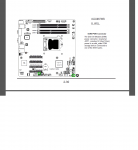Damn, I can't argue your last posting. ;) I would love to see the throughput benchmarks on those devices.
So I think the argument for or against DOM will be cost and longevity, not really connectivity. Here is how I see it...
Connectivity: If a user has an available SATA port then that is the best place to invest into a storage product. If they do not then a USB adapter of sorts would be the next best thing.
Longevity: What features does a DOM bring that a typical SSD doesn't have, besides possibly a smaller form factor and no mounting required?
Cost: A 16GB DOM is approximately $36 to $60 (according to my quick Google Shopping search). The cost of a new 64GB Internal SSD is $40.
Also I'm curious on the technology built into a DOM, I'm sure there are different qualities/speed of Flash memory being used.
@BigDave, see what can of worms you opened up! :p

